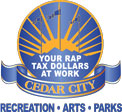2023 Update: Citizens will vote on the reauthorization of the RAP fund on Nov. 21, 2023. Numerous local arts organizations are using these funds to provide theater, art, music, and dance for the area. Parks and recreation projects have include trails, playgrounds, pickleball courts, lake on the hill, playing fields, and parks. One penny makes a difference in making Cedar City a better place to live.
2014 Report: The residents of Cedar City have achieved yet another milestone in continuing to make Iron County an important regional arts  and culture destination in the intermountain west. In November of 2014, the request for funding for another 10 years of RAP Fund (Recreation, Arts, and Parks) was resonantly passed by more than 67% of voters.
and culture destination in the intermountain west. In November of 2014, the request for funding for another 10 years of RAP Fund (Recreation, Arts, and Parks) was resonantly passed by more than 67% of voters.
The RAP Fund is an additional one-tenth-of-one-percent sales tax levied on all purchases within the city. If, for example, a person, including tourists and those just passing through, were to spend $10 at a store, one cent would be allocated to RAP Fund.
The RAP Fund is allowed under Utah law and uses for the money are restricted. Allocation of the revenues must be divided into thirds and spent one-third each to recreation, arts and parks. When first allowed by the state, the RAP Fund was voted on in seven-year periods. However, the law has changed, and if approved by city voters in November, the tax will last for the next 10 years.
It is such an integral part of who we are, it is what the city stands for. I really think Cedar City stands for education and artistic endeavors. I have seen the president of a business quote Shakespeare from the stage at the Randall Jones Theatre. I have seen a US Bank board meeting held in Cedar City because of our desirability, and I have seen guests that come to the festival that aren’t donors tell me that the cultural activities in this community saved their child from going down the road to abuse of some sort, whether it be drugs or anything else, because they had something to be a part of. So I don’t see this as a tax. What we get back from this investment in this community far outweighs what the dollars and cents shown at the bottom of the balance sheet.”
